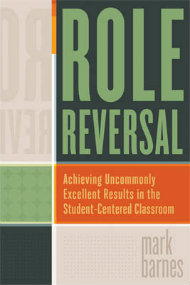Not for Control Freaks: Increasing Student Autonomy
Role Reversal: Achieving Uncommonly Excellent Results in the Student-Centered Classroom
By Mark Barnes
(ASCD, 2013 – Learn more)
This past year I’ve tried my darndest to give students choice in many aspects of our 80 minutes together. I’ve all but eliminated homework and tests in my 7th grade ELA classes. My classroom dynamics, after 18 years of teaching, have changed a lot recently and are not what many teachers would call “traditional.” So why do I feel I still need more autonomy for my students? The next professional book I had to read was ROLE Reversal by Mark Barnes.
Barnes starts off talking about Daniel Pink’s Drive, and how the need came about to change his classroom. Many of the resources he cites are items I’ve already read, so he had me on board to listen to his “radical” ideas on page one. However, I can be a skeptic, so I read with caution, waiting for specifics as to how he could actually pull this off. No worksheets, homework, tests or quizzes, lectures, grades….
Grades? Really? I have some experience with the first four, but no grades? Not only this, but Barnes asks, “What if you never again had a discipline issue in your class?” (p10). I had to keep reading about the Results Only Learning Environment, or “ROLE.”
1. incorporating a year-long project
2. talking less
3. building choice into all activities
4. converting to a workshop setting
5. integrating technology
You may question much of what Barnes says in the first few chapters about being a “rebel” in your school and having “no rules.” I felt I didn’t even need to read chapter three, as it’s about giving up worksheets and homework, but it did affirm what I already believe.
Feedback and results
The most valuable chapters to me were about feedback (ch 5, 6, & 7). After all, how does a teacher do the five things listed above and get results? School should be about the learning, not the grade. It’s about mastering concepts, not being tested on them, perhaps failing, and then moving on anyway. It’s about creating a love of learning, and Barnes knows that.
He gives myriad ways teachers can give consistent verbal and written feedback to students, instead of grades. He shows the reader how to scaffold this process if students (or teachers) are having a hard time of it. He makes this environment seem feasible, and I started really contemplating if… or HOW… I could do this in my classes.
My skeptical side was eventually satisfied, but not until I was well into the book. Barnes finally admits to having felt like abandoning the system altogether. He also says that “Your students are still kids, and they are subject to poor judgment, no matter how hard you coach them on decision making” (p151). But isn’t that multiplied ten-fold when you have seemingly worthless worksheets, unfinished homework, stressful testing situations, boring lectures, and letter grades that mean squat?
A tad more autonomy?
I’d love it if I could copy and paste what Barnes has on his class website. ;-) I’ll be applying many of his ideas on our class site, for sure. I’d also love it if he gave just a tad more autonomy to the students. Where I found student choice lacking is in the year-long projects that are so integral to the design of this type of environment. But then I wonder how students can assess themselves if there is nothing teacher-driven to work towards…
If you are a control freak, this book is not for you. If you like lecturing to students, assigning worksheets, and marking up tests, don’t even bother. However, if you want real change and students who are engaged in their learning, and you are willing to start with even just one or two of these ideas, you’ll find that Barnes backs up all he does with good reasons, and there’s no way your ideas will stay the same.
Joy Kirr currently teaches 7th grade LA & Literature in a suburb of Chicago. She was first a special education teacher working with deaf & hard-of-hearing students, and next became a reading specialist and National Board Certified. She’s completed her 18th year of teaching, but “I keep learning more about education and children, so it’s always like my first!”





































1 Response
[…] For a review of the book I refer my blog followers to my good PLN friend Joy Kirr’s (@joykirr) post on her blog last year ROLE Reversal Review. […]